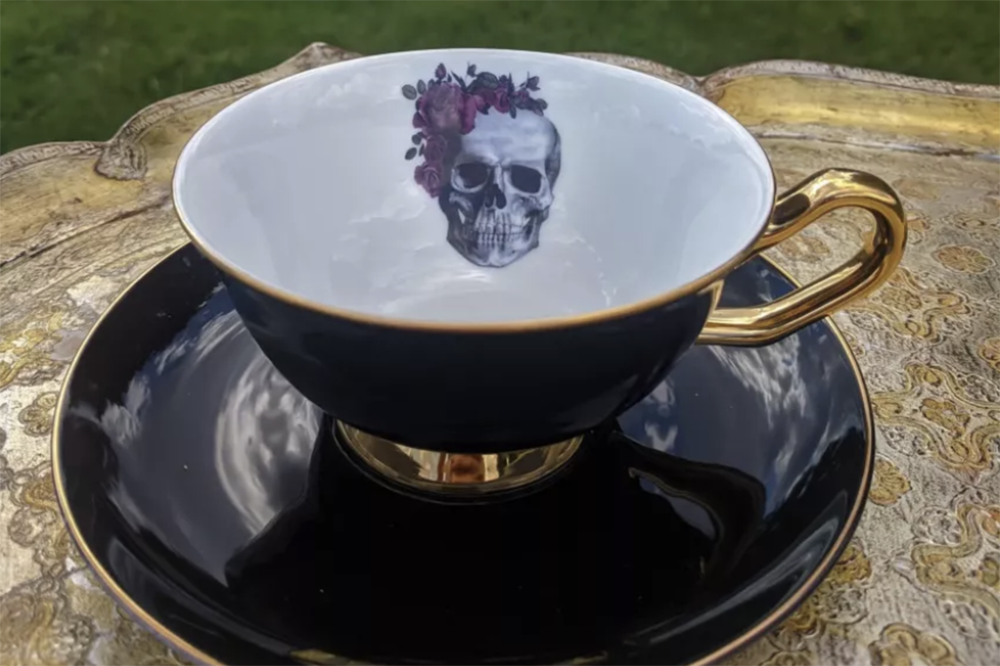Life
 Photo from congressionalcemetery.org/death-positive-programming/.
Photo from congressionalcemetery.org/death-positive-programming/.
D.C. Death Cafes: Getting Cozy with Mortality
November 9, 2023 @ 10:00am
Nothing is certain but death and taxes, as Benjamin Franklin famously said, yet over 200 years later, mortality and money are still off-limits at the dinner table. Death Cafés seek to spark open and honest conversations on death and dying.
“A lot of people are really awkward around death, but many people do want to have these conversations and are so relieved when they do,” Laura Lyster-Mensh, Death Doula in Residence and a death café facilitator at D.C.’s historic Congressional Cemetery, says. “It’s not just a better way to die; it’s a better way to live.”
During the pandemic, Lyster-Mensh trained as an end-of-life doula and hospice volunteer. She now volunteers at the Capital Caring hospice unit at Sibley Hospital in addition to leading monthly death cafes and weekly “death doula days” for the cemetery, where people tick off tasks like writing their own obituaries or living wills.
Death Cafes first broke ground in London, but its roots run much deeper. In previous societies, notably during the Victorian Age, people were encouraged to regularly reflect on their mortality. Memento mori – Latin for “remember that you die” – was a visual reminder of one’s mortality, embedded like Easter eggs in medieval art and architecture through symbols like skulls and hourglasses.
Contrast that with today’s use of skull and crossbones as emoji shorthand for “I’m dead,” slang terms for dying of laughter, and it’s clear how disconnected we’ve become from death symbology.
The opening ground rules of a recent death café led by Lyster-Mensh were to the point: “We are here to talk about our own mortality, not process the deaths of others, so please use ‘I statements.’”
View this post on Instagram
One would be forgiven for expecting a Death Café to be a somber, sobering gathering, yet the dozen-odd strangers circled up in the cemetery’s tiny chapel over wine, tea and cookies found many moments of laughter and kinship. Over the course of 90 minutes, a rainbow of topics were broached, from assisted suicide to alternative burials. It was led Quaker Meeting style, with no prompts and few rules but to speak on topic and from the heart.
Kieran Evans, a licensed social worker based in northern Virginia, is a regular at Congressional Cemetery’s Death Café.
“I’ve always been interested in exploring the taboo and unspoken aspects of the human experience, and mortality is definitely one of those topics,” Evans says. “But it was the death of a loved one a few years ago that really catalyzed my interest in finding a space to discuss death in an unvarnished way. I wanted to find a space to discuss death without the linguistic sanitization that too often goes along with bereavement support.”
The Death Café movement comes at a time where death is not acceptable small talk even in the most forward-thinking social circles. Participants in a recent café mused on today’s obituaries, scrubbed of any mention of means of death, while others questioned the stigma attached to “death wishes,” suicidal ideations, and even living wills. More than a few felt that one should be free to make choices about how and when they die – arguably a more important choice than what happens to their bodies afterward.
View this post on Instagram
While views on death, dying, and the afterlife were as diverse as the individuals in the room, café attendees were united on the need to foster a more “death positive” society — the idea that talking openly about death is healthy and helps one appreciate life.
“Talking about death should be normal because death is normal,” says Evans. “We all die. And yet we live in a society where dead things are kept largely out of sight and therefore out of mind. But all of us have to think about death at some point, whether it’s to execute the advanced directives of a loved one, create a living will, experience the figurative slap of mortality from a terminal health diagnosis, or go through the pain of loss of any kind.”
Death cafés occupy all kinds of spaces, from community centers to online meetups. Death Over Dinner helps visitors to plan their own facilitated death-centered conversations with loved ones while Death Cafe lists death café events around the world. The Order of the Good Death is another great resource for exploring the death positivity movement.
The Congressional Cemetery’s next Death Café will be held in its historic chapel December 12 at 6 p.m. Visit here to learn more about their programming.
Want first access to activities and events happening in the DMV? Join the District Fray community for exclusive access to neighborhood guides and recommendations. Become a member and support local journalism today.







